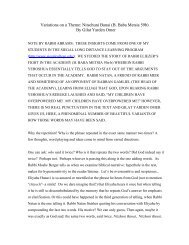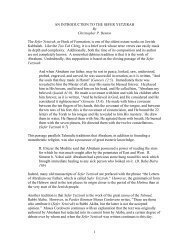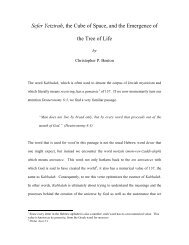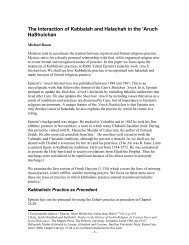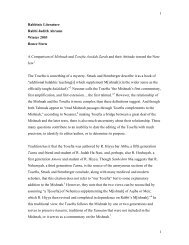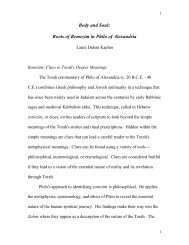The Symbolic Representation of the Sefer Torah - Maqom
The Symbolic Representation of the Sefer Torah - Maqom
The Symbolic Representation of the Sefer Torah - Maqom
You also want an ePaper? Increase the reach of your titles
YUMPU automatically turns print PDFs into web optimized ePapers that Google loves.
According to <strong>the</strong> custom in Rome, a mi sheberach was read for women who prepared <strong>the</strong> <strong>Torah</strong> sash(known in Europe as <strong>the</strong> wimple). It reads “He who blesses our Mo<strong>the</strong>rs Sara, Rivka, Rachel and Lea, Heshould bless all <strong>the</strong> daughters <strong>of</strong> Israel who prepared <strong>the</strong> coat or <strong>the</strong> sash in honor <strong>of</strong> <strong>the</strong> <strong>Torah</strong> andprepares a candle in honor <strong>of</strong> <strong>the</strong> <strong>Torah</strong>. May <strong>the</strong> Lord pay her deserved reward and award her goodfortune. And let us say Amen.” 70In recent years, <strong>the</strong>re has been a great demand to recite mi sheberach prayers for <strong>the</strong> sick. Betweeneach portion <strong>of</strong> <strong>the</strong> <strong>Torah</strong> reading, <strong>the</strong> invitee to <strong>the</strong> <strong>Torah</strong> <strong>of</strong>ten requests a blessing (mi sheberach) to berecited for <strong>the</strong> recovery <strong>of</strong> a sick person. <strong>The</strong> text for this prayer is found in all contemporary prayer books.An investigation <strong>of</strong> <strong>the</strong> source <strong>of</strong> this custom has revealed very little. <strong>The</strong> codes <strong>of</strong> law do not discuss it,and <strong>the</strong> majority <strong>of</strong> <strong>the</strong> sources on custom and ritual do not include it. Originally this blessing invoking <strong>the</strong>power <strong>of</strong> <strong>the</strong> <strong>Sefer</strong> <strong>Torah</strong> was used for life-threatening cases, thus justifying its reading on <strong>the</strong> Sabbath, atime (as discussed above) when one does not make requests from G-d. Yaari (1958, p. 124) traces <strong>the</strong> misheberach for <strong>the</strong> sick to Worms in 1190. <strong>The</strong> text <strong>of</strong> <strong>the</strong> prayer includes <strong>the</strong> <strong>of</strong>fer <strong>of</strong> a charitabledonation. 71 In order to justify <strong>the</strong> custom <strong>of</strong> reciting a mi sheberach for any level <strong>of</strong> illness, <strong>the</strong> words“though <strong>the</strong> Sabbath prohibits us from crying out, may a recovery come speedily” is added. <strong>The</strong> Rama(O.H. 288:10) rules “It is also permitted to make a blessing for a sick person in mortal danger on that day.”<strong>The</strong> Arukh Hashulkhan (O.H. 287:2), first quoting <strong>the</strong> Geraz, summarizes <strong>the</strong> law, “When we recite <strong>the</strong> misheberach for <strong>the</strong> sick in <strong>the</strong> synagogue [during <strong>the</strong> <strong>Torah</strong> reading] one should not say as during <strong>the</strong> weekstating “<strong>the</strong> Lord should send a cure” but ra<strong>the</strong>r ‘though <strong>the</strong> Sabbath prohibits us from crying out, may arecovery come speedily’ but we bless ‘and <strong>the</strong> Lord should send a total cure, etc., though <strong>the</strong> Sabbathprohibits us from crying out, may a recovery come speedily’ as printed in <strong>the</strong> prayer books. I do not knowwho permitted this, for it is only for a very dangerously sick person [life-threatening] who is immediatelyin danger.” <strong>The</strong> Mishnah Berurah (O.H. 288:28) commenting on <strong>the</strong> Rama writes “But not for someonewho is not in mortal danger.” He <strong>the</strong>n continues to explain: “When a mi sheberach prayer is said for a sick70 See Hamberger 2000, p. 36271 Avraham Levinson in his Mikorei Minhagim (section 16) writes that in contrast to o<strong>the</strong>r synagogue donations that need not bepaid until <strong>the</strong> sexton asks for <strong>the</strong> funds, in <strong>the</strong> case <strong>of</strong> a sick person one must pay immediately.30



